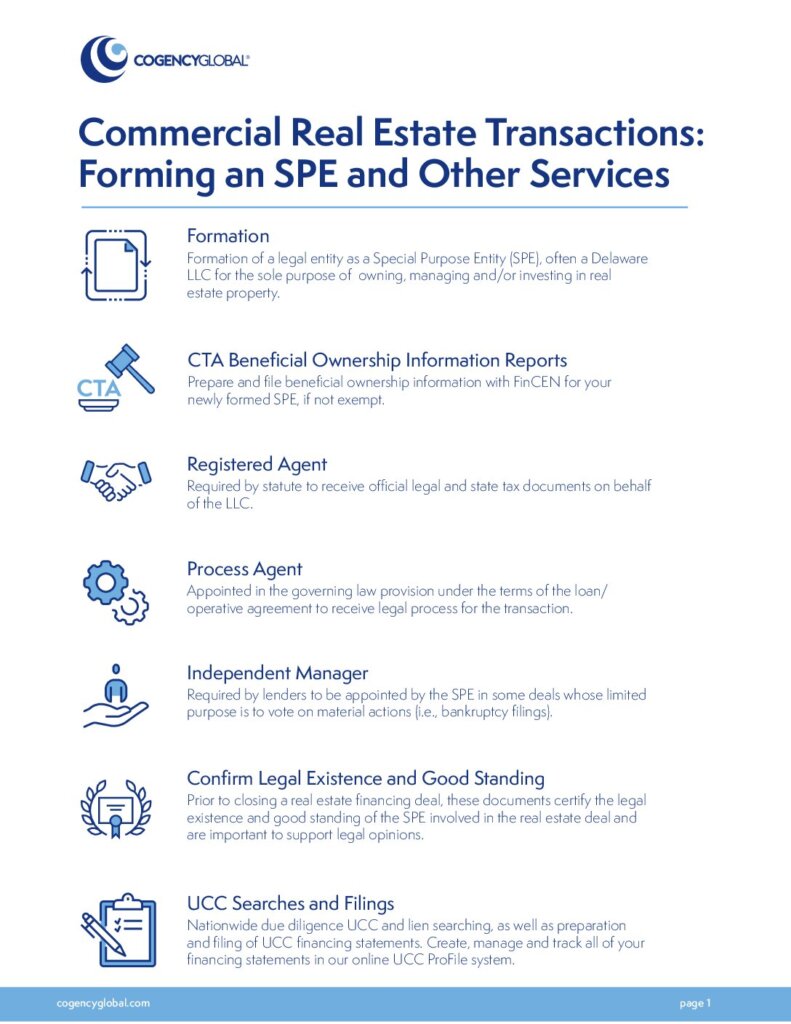
Commercial Real Estate Transactions: Forming a Special Purpose Entity
This piece explores Special Purpose Entities (SPEs) in commercial real estate, emphasizing their role in limiting financial risk and improving creditworthiness. It covers key characteristics like limited purposes and independent directors, along with their benefits in securing better financing.
What this is: There are many legal and financial details to be considered when working on commercial real estate financing transactions.
What this means: Partnering with a knowledgeable service provider as a one stop shop to support the services included in this article will help streamline your transaction. We explain why.
What is Involved in Commercial Financing Real Estate Transactions?
Commercial financing real estate transactions typically involve the purchasing and financing of a property. This process requires thorough due diligence, involving multiple legal and financial advisors.
The formation of a new legal entity for each transaction is common practice. Delaware limited liability companies are typically favored for these types of transactions. However, that is not always the case and the choice of other jurisdictions of formation and entity types are subject to advice from legal and financial advisors.
The Importance of Finding a Good Service Provider
These transactions often involve legal counsel for the company and service providers to assist with company formation and other advisors. You’ll want to partner with a knowledgeable service provider who understands commercial real estate transactions and routinely works with legal counsel on coordinating the formation of the new company, qualifying/registering the company to do business in the state where the property is located, UCC, tax and lien searches and filings and additional services as illustrated above. As an important note, the service provider you work with to support these services should be aware of the timeline of your closing and ensure all filings, appointments and evidence of good standing are completed and delivered in advance of your closing date to avoid any delay in closing.
A Visual Overview

Other Reads You Might Enjoy
Why is New York governing law often chosen in commercial real estate transactions?
New York courts have interpreted and developed a body of case law that has addressed many of the most sophisticated commercial transactions since the beginning of the Industrial Revolution. Its history of case law is rivaled only by English law. And despite English law’s notable head start of a few hundred years, New York has, nevertheless, distinguished itself ahead of all other bodies of commercial law by adopting some concepts of civil law. If you’d like to learn more about this topic, read our article, Why Choose New York Governing Law in Commercial Real Estate Transactions?
At what point in a cross-border or domestic US transaction should a process agent be selected?
If your cross-border or domestic US transaction requires a process agent, it is important to select that process agent prior to the transaction’s closing and include that choice as part of the closing checklist. A professional process agent should be knowledgeable about the various types of legal proceedings in multiple jurisdictions and understand the urgency of the steps that must be taken in the event that legal action should be taken as part of a transaction. Work with a process agent that can support you in any jurisdiction based on the requirements of your transaction and/or governing agreements. Read our article, Process Agent Appointment: Choice of Law in Multiple Jurisdictions, for more information.
What is the role of a registered agent?
Generally, the role of the registered agent is to receive any legal process (i.e., summons and complaints, legal notices) and official correspondence from Secretaries of States where your company is registered (i.e., annual report tax notices) and forward these time-sensitive documents to the designated contacts at your company. But the registered agent is also another partner on your team and can assist your lawyers and in-house legal and accounting teams with ongoing services even after your company is formed. Refer to our article, How Do I Form and Register My Company Nationwide? to learn more.
This article is provided for informational purposes only and should not be considered, or relied upon, as legal advice.



Leave Us A Comment
Did you find this article useful? We'd love to hear your thoughts. Join the conversation by leaving a comment or question below.